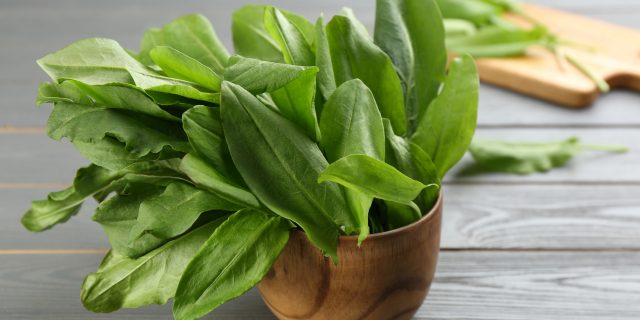Is sorrel as useful as it is considered to be
The leaves of the plant are said to boost the immune system and save you from cancer.

What is the sorrel known for?
Sorrel is a perennial herbaceous plant. Its leaves and roots are endowed with medicinal properties and used in folk medicine as a choleretic, as well as to improve appetite, stop bleeding, boost immunity and prevent cancer.
What exactly is sorrel good for
At the very least it is not harmful to the figure and contains substances our body needs.
It helps to lose weight
In 100 grams of leaves there are only 22 kcal. Therefore, you can prepare salads, soups and sauces from sorrel, even those who are on a diet.
Protects cells from destruction
The plant contains various polyphenolic compounds, which are natural antioxidants. They prevent aggressive free radicals from damaging the body’s cells.
Replaces vitamin deficiencies
Sorrel contains seven vital vitamins. And some of them are quite a lot. So, if you eat 100 grams of leaves, you can provide yourself with half the daily norm of vitamin C, 28% of vitamin A and 9% of the norm of vitamins B2 and B6.
Rich in minerals
More in the leaves a lot of useful micro- and macronutrients. So, in 100 g contains 20% of the daily norm of iron, 15% – potassium and 7% – calcium.
What is probably the usefulness of sorrel?
Scientists are carefully studying the properties of sorrel and the possibility of its use in medicine. While the research is conducted in test tubes and on animals. But such experiments show that the plant can be used in the creation of new drugs.
Reduces blood pressure
Researchers obtained an extract from sorrel leaves and administered it to rats with normal and elevated blood pressure. It turned out that the resulting solution dilates blood vessels and so helps in the treatment of hypertension.
Destroys fat
Another in vitro study showed that polyphenolic compounds stimulate lipolysis, or the breakdown of fat, in adipocyte cells and also prevent them from dividing. Fats are eliminated from the body faster and weight is reduced.
Protects against germs
To a colony of E. coli in a laboratory dish was added sorrel extract dissolved in methanol. It turned out that the bacteria can’t multiply because of the phenolic compounds found in the plant.
Reduces the risk of blood clots
In experiments on rats, it was found that sorrel extract reduces the ability of platelets to stick together and form clots. So the risk of dangerous blood clots and the development of heart attack and stroke is reduced.
Prevents infection with influenza A and herpes simplex viruses
Researchers discovered the substance procyanide in sorrel leaves. In the laboratory it was found that it prevents the influenza A virus to attach to the cell and penetrate it, and thus prevents infection.
Another study showed that procyanide and flavonoids from sorrel leaves prevent the herpes simplex virus type I from entering the cell.
Reduces cholesterol levels
A study on rats simulated carbon tetrachloride poisoning, which is toxic to the liver and increases the synthesis of triglycerides and “bad” cholesterol. The animals were then given sorrel leaf extract. It normalized the concentration of lipids in the blood of the rats.
Keeps tumors from developing
The substances anthraquinones were found in the leaves of the sorrel. They were added to the cells of ovarian, lung, nervous system and colon tumors in laboratory cups. It turned out that under the influence of such a solution, cancer cells not only die, but also stop mutating.
So should you eat more sorrel?
Yes, you can try it. Of course, the properties promised by folk medicine are hardly confirmed, and studies of beneficial properties have not yet been conducted on humans. But still sorrel has a lot of vitamins and minerals and few calories.
The main thing is not to overdo it. In 50 g of leaves there are 150 mg of oxalic acid, or oxalate. This substance is not harmful if consumed in moderation. But if you eat 25 grams of oxalate all at once, you will get severe kidney damage. It is unlikely that someone can do it: we are talking about 8 kilos of sorrel.
It is better not to eat a lot of sorrel with kidney stones. Intestinal diseases increase oxalate absorption, so the risk of kidney damage is higher with Crohn’s disease or ulcerative colitis.





